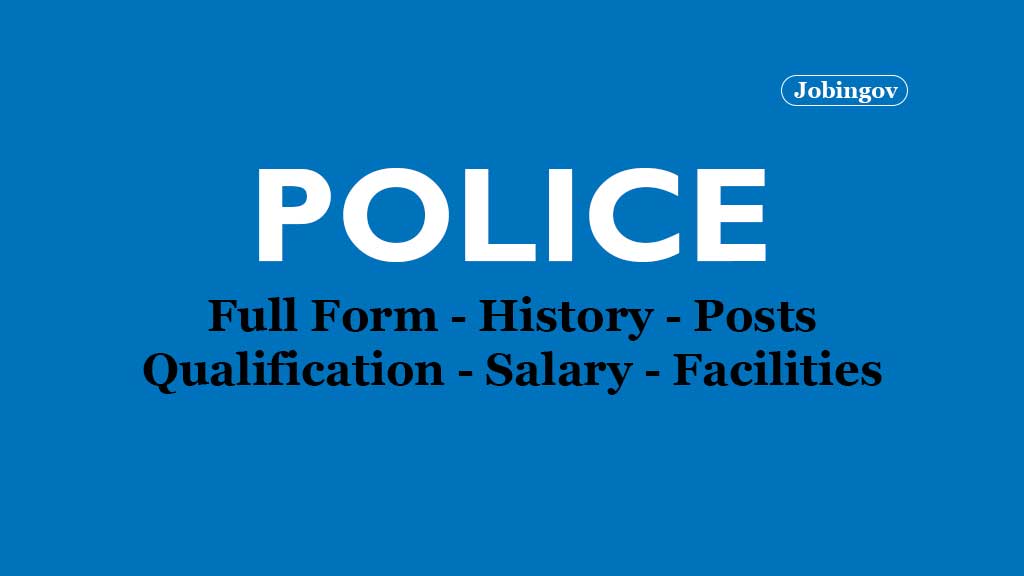Police after hearing the word, what comes first in our mind is that A person or group of person with well uniformed and are maintaining law and order. Generally, the term “POLICE” has no full form but we can see various conventional full forms such as Polite Obedient Loyal Intelligent Courageous and Efficient.
They have the different names in different country. The police are a constituted person who is empowered by a state, who has the duty or aim to enforce the law, to ensure the safety, health and possessions of citizens, and mainly responsible to prevent crime and civil disorder.

The word police are now a universal word and similar types of terms can be seen in many countries. There are different types of slang terms is used to referred the police.
The Most popular and one of the oldest slang is “cop“. The word “cop” lost its slang connotations and become a common term by the public and police officers to refer to their profession.
Different Full Form of Police
Other than the given above full form of police, there are also some alternative full form used for the term Police are:
- Protection of Law in Case of Emergency
- Polite Obedient Loyal Intelligent Courageous and Encouraging
- Protection of Life in Civil Establishment
- People Often Lie in Confidence Everywhere
- Protectors of Law in Countries Economy
- Protection of Life and Investigating Criminals Establishment
- Public Officer for Legal Investigations and Criminal Emergencies
- Polite Obedient Loyal Intelligent Courageous and Efficient
- Persons of Low Integrity Controlling Everyone
Required Qualification for Police Job
To become a police officer, the candidate need to have graduate degree. And to become police constable the qualification is 12th passed.
Age limit 18 years to 25/27 years (varied as per the post, exemption is allowed to Schedule caste, schedule tribe and OBC as per government rules).
For higher post like SP or ASP a candidate must need bachelor’s degree with good education background.
Post Categories of Police
Establishment of law and order in any state is a matter of state and is also mention in the state list of Indian Constitution. The common pattern which is found in the department of police in various states are given below.
We can notice main two types of officers in the department of Indian Police i.e. Gazetted and Non-Gazetted officer.
Gazetted Police Officer
- Director of intelligence bureau (DIB)
- Director general of police (DGP)
- Additional director general of police (ADGP)
- Inspector general of police (IGP)
- Deputy Inspector General of Police (DIG)
- Senior superintendent of police (SSP)
- Superintendent of police (SP)
- Additional superintendent of police (Add. SP)
- Assistant superintendent of police (ASP)
- Assistant superintendent of police (ASP, rank during probation: 2 years of service)
- Assistant superintendent of police (ASP, rank during probation: 1 year of service)
Non-Gazetted Police Officer
- Inspector (INS)
- Assistant inspector (API)
- Sub-inspector (SI)
- Assistant sub-inspector (ASI)
- Head constable (HC)
- Senior police constable (SC)
- Police Naik (PC)
- Constable (C)
Selection Process for Police Recruitment
The candidates have to go through a recruitment examination and then a medical and physical test to become police officer, and in case of higher post there’s an interview is included.
Responsibility of Police
Police has very important role in our society, it may vary as per the situation. We can classify the role of a Police personnel as per their responsibility in two types. The first type as preventive (uniformed) police and other type as detectives.
There are also some Specialized Police force which are familiar with various names in different countries of the world. The major responsibilities of the Police force are:
- Provide Protection of life and property
- Establishment of criminal laws
- Investigate criminal activities
- Regulate and control traffic
- Control and manage crowds
- Provide safety to the public
- Civil defense
- Manage emergency situations
- Run search operations for missing persons
- Maintain public order
- Intelligence Services
- Management of security
- Counter Terrorism or Terrorist attacks
- Provide VIP Protection
- Play important role during any kind of Disaster
- Crisis Management
Whatever may be the volume, employees of the police forces are provided multiple ranks and they work together as a team.
Salary and Facilities of a Police Officer
A. Director general of police [Head of State Police Forces, Director of the Intelligence Bureau (IB), Special director in IB, Director of Central Bureau of Investigation (CBI), Director General of National Investigation Agency (NIA), Commissioner of Police of Delhi, Director General of a Central Armed Police Forces (CAPF)].
Salary: ₹225,000, apex scale, pay level 17
Also Read: What is the full form of CRPF?
B. Director general of police [Special Director General in CAPFs, Special Secretary (Internal Security), Ministry of Home Affairs Special Secretary in Research and Analysis Wing, Special Director in IB, Special Director in CBI, Director of Sardar Vallabhbhai Patel National Police Academy (SVPNPA), Director General of Bureau of Police Research and Development, Director General of Narcotics Control Bureau].
Salary: ₹205,400 – ₹224,400 [ HAG+ Scale (pay level 16)]
C. Additional director general of police [Director of National Crime Records Bureau, Director (Special Protection Group), Special Commissioner of Delhi Police, Commissioner of Police (City Police Commissionerate), Additional Director General in NIA, Additional Director in IB, Additional Director in CBI, Additional Director General in CAPFs].
Salary: ₹182,200 (US$2,400) – ₹224,100 (US$3,000) [ HAG scale (pay level 15)]
D. Inspector general of police (Commissioner of police/ city police Commissionerate, Inspector General in CAPFs, Inspector General in NIA, Joint Director in IB, Joint Director in CBI, Joint Director in SVPNPA).
Salary: ₹144,200 – ₹218,200 [ Senior administrative grade (pay level 14)]
E. Deputy inspector general of police (Commissioner of police/city police Commissionerate, Deputy inspector general in CAPFs, Deputy inspector general in NIA, Deputy Director in IB, Deputy Inspector General in CBI, Deputy Director in SVPNPA).
Salary: ₹131,100 – ₹216,600 [ Super time scale (DIG/Conservator grade) (pay level 13A)]
F. Superintendent of police (selection grade)
Salary: ₹118,500 – ₹214,100 [ Selection grade (pay level 13)]
Superintendent of police [ Junior administrative grade (pay level 12)]
Salary: ₹78,800 – ₹191,500
G. Additional superintendent of police [ Senior time scale (pay level 11)]
Salary: ₹67,700 – ₹160,000
H. Deputy Superintendent of Police [ Junior time scale (pay level 10)]
Salary: ₹56,100 – ₹132,000
I. Inspector of Police
Salary: 9300 – 34800 INR along with Grade pay of 4,200 INR
The initial gross salary will be 35,000/- PM
J. Police Constable
Salary: 5200 – 20200 INR along with Grade pay of 2400 INR
The initial gross salary will be, 25,000/- per month
Related Posts:
Conclusion
We hope this post will help you to know the Police Full Form, Qualification, Responsibility, Selection Process, Salary and Facilities, etc. For get more full form, visit this website regular basis. Also, you can follow us on Facebook and Twitter to get latest post notification immediately.
Police Full Form: FAQs
Q1. What is the full form of POLICE?
Ans: The full form of POLICE is Polite Obedient Loyal Intelligent Courageous and Efficient.
Q2. What are the type of Police?
Ans: Generally, there are two types of police forces like civil (unarmed) police and armed contingents.
Q3. Which post is the highest rank of police in India?
Ans: DGP (Director General of Police) holds the highest rank of police in various states and union territories in India.
Q4. Why is the color dress of police being khaki?
Ans: As the member of police department needs to work in the dirty condition, the dress they wear gets dirty. So, the color of police dress chosen as khaki where doesn’t reflect the dirt of the uniform.
Q5. What is the limitation of age to become police?
Ans: Candidates must attain the age between 18 years to 27 years but the upper age limitation is subject to vary.






nice post….good information